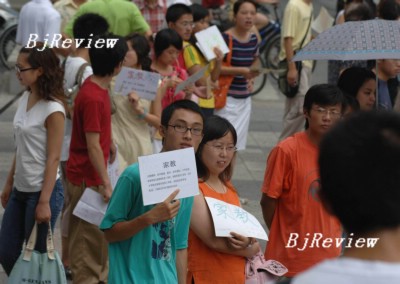
Equal Pension Is Taxpayers' Right
Shenzhen in south China's Guangdong Province has revised its pension policy to make it easier for workers without a Shenzhen hukou (permanent residence permit) to benefit from the city's pension scheme. According to the new rule, non-hukou holders no longer need to contribute to the pension scheme for five consecutive years before retirement, but they are eligible for a monthly pension as long as they contribute to the city's pension fund for 15 years or more. As a result, migrant workers and expats are entitled to the same pension treatment as Shenzhen's hukou holders.
In the past decade or so, China has developed a social endowment insurance system, but this network covers only a few migrant workers or expats in cities. Even if it does, non-hukou holders are often required to contribute more to the pension fund than locals.
Obviously, the Shenzhen Government has realized that if non-hukou holders are treated indifferently, the city will seem unfriendly, which will finally affect its competitiveness. After all, as a migrant city, to a large extent, Shenzhen's development depends on people from outside the city, both white collars and blue collars. It's hoped that more Chinese cities may realize the significance of what Shenzhen has done to accommodate its migrant population.
China Youth Daily
Just Who Benefits From Fines?
It's reported that administrative fines and penalties have become a major source of some government agencies' revenues.
Although it is explicitly stipulated that all the fines collected should be turned over to the state and administrative expenses will be covered by local governments' budgets, it seems that these departments never miss any opportunity to fine rule violators. Moreover, in some parts of the country, fines are directly connected with officials' income. As a result, arbitrary fines and charges emerge, paving the way for the embezzlement of national funds by some departments.
Some argue that certain local governments have difficulties in balancing their books. However, a budget deficit should never be used as an excuse for arbitrary fines. Government agencies' administrative and law enforcement powers are supposed to serve the people, not to act as tools for individual or departmental interests.
People's Daily
Restoring Faith in Education
According to the China Youth and Children Research Center (CYCRC), there is a resurgence in the belief that there are no benefits to education, but unlike in the past when this mindset resulted from ignorance, today it resurfaces because of people's disappointment in the education system.
Education means not only the spread of knowledge, but also financial input from individuals, families and society. As a result, parents have great expectations that their children will earn handsome salaries after graduation. This, of course, does not always happen. Currently, the needs of college students, especially those from rural areas, will eat into much of the family savings, often placing the family in large debt. After graduation, their salaries are often barely enough to sustain themselves, let alone their families. Some cannot even find a job long after graduation. As a result, people's enthusiasm for education has taken a knock, as borne out by CYCRC's latest statistics.
China's economic development in the past two decades should be attributed largely to its high-quality labor force. The country's future economic progress will surely depend more on these and other educated workers. The problem is that whereas the government was the major investor in education in the past, this financial burden has now been transferred to families. So, while government is now benefiting from the education sacrifices families are making financially, it is failing to make a corresponding investment. Similarly, while families have made huge investments, they are not getting the returns they feel they deserve.
To tackle this problem, the government should first prevent education costs from continuing to rise and increase allocations from the state coffers. Then, a more proactive job creation program is needed to ensure promising prospects for educational investment.
Oriental Morning Post
Environmental Campaign Must Be Ongoing
In the latest efforts to clean up the environment, a total of 82 projects involving steel, power, metallurgical and chemical sectors have been openly criticized for failing to meet the mandatory environmental procedures. Along with this, the country's four most polluted cities and four major power producers have also been banned from launching new projects until they correct problems with their existing generating facilities, in an effort to curb blind expansion of pollution-intensive industries.
These moves are undoubtedly a result of the failure of environmental protection efforts in the previous years, which has threatened the country's sustainable development. Losses caused by environmental problems are estimated to be a staggering 10 percent of China's GDP.
The deteriorating environment proves that sporadic protection efforts are incapable of solving this serious problem and that stricter measures are required. Most importantly, all the efforts to protect the environment must be consistent and ongoing, and should be regarded as one of the country's basic state policies.
Only when the environmental protection campaign is a regular occurrence can it be a real deterrent to irresponsible officials, who will know they cannot keep getting away with turning a blind eye to this national catastrophe and that eventually they will be brought to book.
Shanghai Securities News
| 